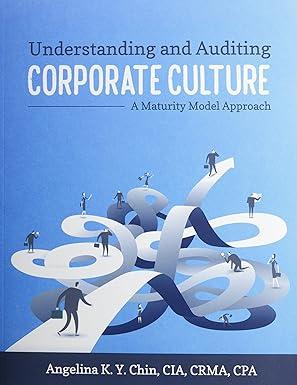Question
a. Describe three reasons why auditors consider a client's internal control when performing the audit 1. 1. Identifying and evaluating the possibility of a major
| a. Describe three reasons why auditors consider a client's internal control when performing the audit 1. 1. Identifying and evaluating the possibility of a major misrepresentation in the financial statements is the responsibility of the auditors. The internal control system of a client aids auditors in comprehending the transactions processed by the client, the controls in place, and the degree to which the controls reduce the risk of misstatement. With this data, auditors can pinpoint regions that pose a greater risk and modify their audit strategy accordingly.
|
| 2. Internal control systems of clients also assist auditors in developing their audit methods. If the client has effective internal controls, the auditor can rely on them and skip fewer in-depth processes. On the other hand, the auditor must carry out more substantial processes if the internal controls are insufficient to gather enough audit evidence.
|
| 3. Compliance with auditing standards: Auditors also consider a client's internal control system when determining if auditing standards are being complied with. According to auditing standards, auditors must comprehend and evaluate the client's internal control system. Auditors can make sure their audit is carried out in compliance with auditing standards and that their report is accurate and credible by doing this. |
| a. Describe three reasons why auditors consider a client's internal control when performing the audit 1. 1. Identifying and evaluating the possibility of a major misrepresentation in the financial statements is the responsibility of the auditors. The internal control system of a client aids auditors in comprehending the transactions processed by the client, the controls in place, and the degree to which the controls reduce the risk of misstatement. With this data, auditors can pinpoint regions that pose a greater risk and modify their audit strategy accordingly.
|
| 2. Internal control systems of clients also assist auditors in developing their audit methods. If the client has effective internal controls, the auditor can rely on them and skip fewer in-depth processes. On the other hand, the auditor must carry out more substantial processes if the internal controls are insufficient to gather enough audit evidence.
|
| 3. Compliance with auditing standards: Auditors also consider a client's internal control system when determining if auditing standards are being complied with. According to auditing standards, auditors must comprehend and evaluate the client's internal control system. Auditors can make sure their audit is carried out in compliance with auditing standards and that their report is accurate and credible by doing this.
|
b. Even the best internal control has certain limitations. Identify and explain two of those limitations.
| 1.?
|
| 2.
?
|
Step by Step Solution
There are 3 Steps involved in it
Step: 1

Get Instant Access to Expert-Tailored Solutions
See step-by-step solutions with expert insights and AI powered tools for academic success
Step: 2

Step: 3

Ace Your Homework with AI
Get the answers you need in no time with our AI-driven, step-by-step assistance
Get Started


